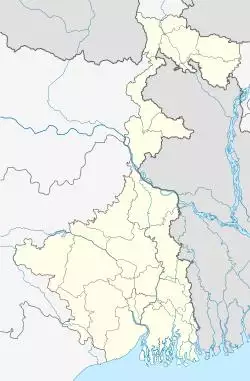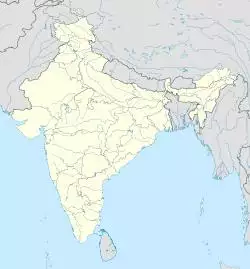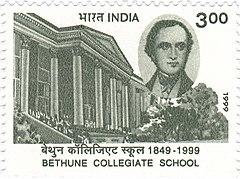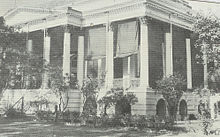 Bethune School Building c. 1949 | |
| Motto | Viddaya Vindatey Amritam |
|---|---|
| Type | Women's college |
| Established | 1879 |
| Affiliation | University of Calcutta |
| Principal | Professor Krishna Roy |
| Location | , , India 22°35′18″N 88°22′04″E / 22.5882°N 88.3679°E |
| Campus | Urban |
| Affiliations | University of Calcutta |
| Website | bethunecollege.ac.in |
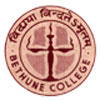 | |
Bethune College is a women's college located on Bidhan Sarani in Kolkata, India, and affiliated to the University of Calcutta. It is the oldest women's college in India.[1] It was established as a girls' school in 1849,[2]:11–12 and as a college in 1879.[3]
History
The college was founded as the Calcutta Female School in 1849 by John Elliot Drinkwater Bethune,[4] with the financial support of Dakshinaranjan Mukherjee. The school started in Mukherjee's home in Baitakkhana, with 21 girls enrolled.[5] The following year, enrolment rose to 80.[6] In November, on a plot on the west side of Cornwallis Square, the cornerstone for a permanent school building was laid. The name "Hindu Female School" was inscribed on the copper-plate placed in the stone and on the ceremonial silver trowel made for the occasion.[7] Support for the school waned after Bethune's death in August 1851.[6]
The government took it over in 1856, renaming it Bethune School after its founder in 1862–63.[4] In 1879 it was developed into Bethune College, the first women's college in India and Bethune school was first women's school in whole Asia.[1]
Notable alumnae
- Kadambini Ganguly (1861–1923), one of the first two female graduates of the British Empire[8]
- Chandramukhi Basu (1860–1944), one of the first two female graduates of the British Empire[8]
- Abala Bose (1864–1951), social worker[9]
- Sarala Devi Chaudhurani (1872–1945), promoter of female education
- Anwara Bahar Chowdhury (1919–1987), social activist and writer
- Kamala Das Gupta (1907–2000), freedom fighter nationalist[10]
- Amalprava Das, social worker
- Bina Das (1911–1986), revolutionary and nationalist[10]
- Tista Das (born 1978), transsexual actress
- Kalpana Datta (1913–1995), independence activist[10]
- Mira Datta Gupta (1907–1983), freedom fighter and activist
- Swarnakumari Devi (1855–1932), poet, novelist and social worker
- Begum Khaleda Zia, first female Prime Minister of Bangladesh
- Ashoka Gupta (1912–2008), freedom fighter and social worker
- Neena Gupta, mathematician, who has provided a solution to the Zariski Cancellation Problem
- Aditi Lahiri (born 1952), academic linguist
- Abha Maiti (born 1925), politician
- Kanak Mukherjee (1921–1995), political activist
- Khanto Bala Rai (born 1897), teacher, school head in Midnapore
- Shukhalata Rao(1886–1969), social worker and children's author
- Kamini Roy (1864–1933), poet, social worker and feminist[9]
- Leela Roy (1900–1970), politician and reformer
- Mamtaz Sanghamita, physician and politician
- Shobha Sen, actress
- Amiya Tagore (1901–1988), singer
- Pritilata Waddedar (1911–1932), revolutionary nationalist
See also
- List of colleges affiliated to the University of Calcutta
- Education in India
- Education in West Bengal
References
- ^ a b LBR, Team (5 May 2018). Limca Book of Records: India at Her Best. Hachette India. p. 161. ISBN 9789351952404.
- ^ Bagal, Jogesh Chandra (1949). "History of the Bethune School & College (1849–1949)". In Nag, Kalidas; Ghose, Lotika (eds.). Bethune School & College Centenary Volume, 1849–1949. Bethune College. p. 11–12.
- ^ Bose, Anima (1978). Higher Education in India in the 19th Century: The American Involvement, 1883-1893. Punthi Pustak. p. 249.
- ^ a b Acharya, Poromesh (1990). "Education in Old Calcutta". In Chaudhuri, Sukanta (ed.). Calcutta: The Living City. Volume I: The Past. Oxford University Press. p. 87. ISBN 978-0-19-563696-3.
- ^ Bagal, Jogesh Chandra (1949). "History of the Bethune School & College (1849–1949)". In Nag, Kalidas; Ghose, Lotika (eds.). Bethune School & College Centenary Volume, 1849–1949. Bethune College. p. 11–12.
- ^ a b Forbes, Geraldine Hancock (1999). Women in Modern India. The New Cambridge History of India. IV.2. Cambridge University Press. p. 39. ISBN 978-0-521-65377-0.
- ^ Bagal, Jogesh Chandra (1949). "History of the Bethune School & College (1849–1949)". In Nag, Kalidas; Ghose, Lotika (eds.). Bethune School & College Centenary Volume, 1849–1949. Bethune College. p. 15-16.
- ^ a b Ray, Bharati (1990). "Women in Calcutta: The Years of Change". In Chaudhuri, Sukanta (ed.). Calcutta: The Living City. Volume II: The Present and Future. Oxford University Press. p. 34. ISBN 978-0-19-563697-0.
- ^ a b Southard, Barbara (May 1993). Colonial Politics and Women's Rights: Woman Suffrage Campaigns in Bengal, British India in the 1920s. Modern Asian Studies. 27. p. 405–406. JSTOR 312775.
- ^ a b c Ghosh, Durba (August 2013). Revolutionary Women and Nationalist Heroes in Bengal, 1930 to the 1980s. Gender & History. 25. p. 355–375.
Further reading
- Borthwick, Meredith (2015). The Changing Role of Women in Bengal, 1849-1905. Princeton University Press. pp. 74–. ISBN 978-1-4008-4390-9.
- Ray, Bharati (2005). Women of India: Colonial and Post-colonial Periods. SAGE Publications. pp. 187–. ISBN 978-81-321-0264-9.
- Tattwabhushan, Sitanath (1904). Social Reform in Bengal: A Side Sketch. Calcutta: City Book Society. pp. 43–.
